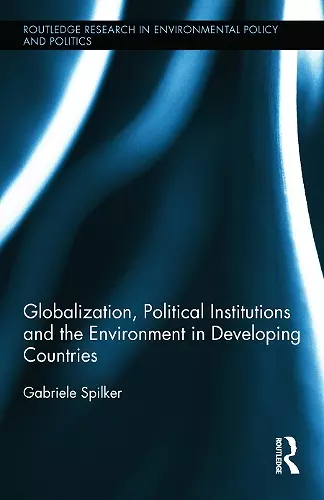Globalization, Political Institutions and the Environment in Developing Countries
Format:Hardback
Publisher:Taylor & Francis Ltd
Published:8th Dec '12
Currently unavailable, and unfortunately no date known when it will be back
This hardback is available in another edition too:
- Paperback£41.99(9781138914643)

Though industrialized countries are usually the ones indicted when environmental pollution is discussed, over the few last years the rate of emissions in developing countries has increased by a startling amount. The fallout from this increase is evidenced by the struggle of cities like Beijing to improve their air quality. Yet there also exist developing countries such as Thailand that have managed to limit their emissions to more tolerable levels, raising the question: why are some developing countries more willing or able to take care of their environment than others?
In this volume, Gabriele Spilker proposes two factors for the differences in developing countries’ environmental performance: integration into the international system and domestic political institutions. Focusing on developing countries generally but also closely examining important global powers such as China and India, Spilker employs a rigorous quantitative analysis to demonstrate the importance of considering various aspects of the international system, in order to draw more comprehensive conclusions about how globalization affects environmental performance. She asserts that democratic political institutions can shield developing countries from the negative consequences of either trade or foreign direct investment. But at the same time, developing countries, by avoiding demanding commitments, are more likely to use environmental treaties as a cover than as a real plan of action.
Adding a new dimension to the existing body of research on environmental quality and commitment, Spilker convincingly demonstrates how international and domestic political factors interact to shape developing countries’ ability and willingness to care for their natural environment.
"This study pioneers the application of sophisticated statistical techniques and theoretical ideas drawn from modern comparative political economy to environmental politics in developing countries. It is able to rigorously demonstrate the effects of economic growth, integration into the international political system, and the interaction between domestic and international influences. Yet the discussion is easily accessible and provides the reader with considerable insight into the background literature. It should be widely read, not only by those interested in environmental politics but also by all those interested in comparative politics."
—Hugh Ward, University of Essex
"A pioneering and ambitious effort to systematically explain patterns of environmental policy outcomes in developing countries. This book by Gabriele Spilker is a serious contribution to the literature and a must-read for anyone who is interested in environmental politics in the developing world, one of the most important and promising areas for enriching our understanding of global environmental politics."
—Xun Cao, Pennsylvania State University
ISBN: 9780415638494
Dimensions: unknown
Weight: 490g
162 pages